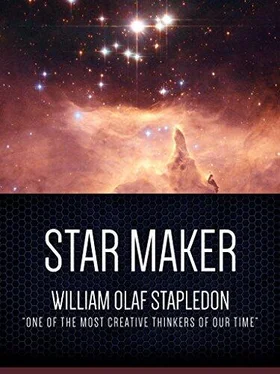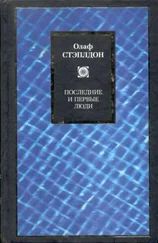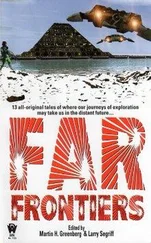We hit upon a plan for satisfying at once our friendship, his interest in my world, and my own longing for home. Why should we not somehow contrive to visit my planet together? I had traveled thence; why should we not both travel thither? After a spell on my planet, we could proceed upon the larger venture, again together.
For this end we had to attack two very different tasks. The technique of interstellar travel, which I had achieved only by accident and in a very haphazard manner, must now be thoroughly mastered. Also we must somehow locate my native planetary system in the astronomical maps of the Other Men.
This geographical, or rather cosmographical, problem proved insoluble. Do what I would, I could provide no data for the orientation. The attempt, however, led us to an amazing, and for me a terrifying discovery. I had traveled not only through space but through time itself. In the first place, it appeared that, in the very advanced astronomy of the Other Men, stars as mature as the Other Sun and as my own Sun were rare. Yet in terrestrial astronomy this type of star was known to be the commonest of all throughout the galaxy. How could this be? Then I made another perplexing discovery. The galaxy as known to the Other Astronomers proved to be strikingly different from my recollection of the galaxy as known to our own astronomers. According to the Other Men the great star-system was much less flattened than we observe it to be. Our astronomers tell us that it is like a circular biscuit five times as wide as it is thick. In their view it was more like a bun. I myself had often been struck by the width and indefiniteness of the Milky Way in the sky of the Other Earth. I had been surprised, too, that the Other Astronomers believed the galaxy to contain much gaseous matter not yet condensed into stars. To our astronomers it seemed to be almost wholly stellar.
Had I then traveled unwittingly much further than I had supposed, and actually entered some other and younger galaxy? Perhaps in my period of darkness, when the rubies and amethysts and diamonds of the sky had all vanished, I had actually sped across intergalactic space. This seemed at first the only explanation, but certain facts forced us to discard it in favor of one even stranger.
Comparison of the astronomy of the Other Men with my fragmentary recollection of our own astronomy convinced me that the whole cosmos of galaxies known to them differed from the whole cosmos of galaxies known to us. The average form of the galaxies was much more rotund and much more gaseous, in fact much more primitive, for them than for us.
Moreover, in the sky of the Other Earth several galaxies were so near as to be prominent smudges of light even for the naked eye. And astronomers had shown that many of these so-called "universes" were much closer to the home "universe" than the nearest known in our astronomy.
The truth that now flashed on Bvalltu and me was indeed bewildering. Everything pointed to the fact that I had somehow traveled up the river of time and landed myself at a date in the remote past, when the great majority of the stars were still young. The startling nearness of so many galaxies in the astronomy of the Other Men could be explained on the theory of the "expanding universe." Well I knew that this dramatic theory was but tentative and very far from satis-factory; but at least here was one more striking bit of evidence to suggest that it must be in some sense true. In early epochs the galaxies would of course be congested together. There could be no doubt that I had been transported to a world which had reached the human stage very long before my native planet had been plucked from the sun's womb.
The full realization of my temporal remoteness from my home reminded me of a fact, or at least a probability, which, oddly enough, I had long ago forgotten. Presumably I was dead. I now desperately craved to be home again. Home was all the while so vivid, so near. Even though its distance was to be counted in parsecs and in aeons, it was always at hand. Surely, if I could only wake, I should find myself there on our hill-top again. But there was no waking. Through Bvalltu's eyes I was studying star-maps and pages of outlandish script. When he looked up, I saw standing opposite us a caricature of a human being, with a frog-like face that was scarcely a face at all, and with the thorax of a pouter-pigeon, naked save for a greenish down. Red silk knickers crowned the spindle shanks that were enclosed in green silk stockings. This creature, which, to the terrestrial eye, was simply a monster, passed on the Other Earth as a young and beautiful woman. And I myself, observing her through Bvalltu's benevolent eyes, recognized her as indeed beautiful. To a mind habituated to the Other Earth her features and her every gesture spoke of intelligence and wit. Clearly, if I could admire such a woman, I myself must have changed.
It would be tedious to tell of the experiments by which we acquired and perfected the art of controlled flight through interstellar space. Suffice it that, after many adventures, we learned to soar up from the planet whenever we wished, and to direct our course, by mere acts of volition, hither and thither among the stars. We seemed to have much greater facility and accuracy when we worked together than when either ventured into space by himself. Our community of mind seemed to strengthen us even for spatial locomotion.
It was a very strange experience to find oneself in the depth of space, surrounded only by darkness and the stars, yet to be all the while in close personal contact with an unseen companion. As the dazzling lamps of heaven flashed past us, we would think to one another about our experiences, or debate our plans, or share our memories of our native worlds. Sometimes we used my language, sometimes his. Sometimes we needed no words at all, but merely shared the-flow of imagery in our two minds.
The sport of disembodied flight among the stars must surely be the most exhilarating of all athletic exercises. It was not without danger; but its danger, as we soon discovered, was psychological, not physical. In our bodiless state, collision with celestial objects mattered little. Sometimes, in the early stages of our adventure, we plunged by accident headlong into a star. Its interior would, of course, be inconceivably hot, but we experienced merely brilliance.
The psychological dangers of the sport were grave. We soon discovered that disheartenment, mental fatigue, fear, all tended to reduce our powers of movement. More than once we found ourselves immobile in space, like a derelict ship on the ocean; and such was the fear roused by this plight that there was no possibility of moving till, having experienced the whole gamut of despair, we passed through indifference and on into philosophic calm.
A still graver danger, but one which trapped us only once, was mental conflict. A serious discord of purpose over our future plans reduced us not only to immobility but to terrifying mental disorder. Our perceptions became confused. Hallucinations tricked us. The power of coherent thought vanished. After a spell of delirium, filled with an overwhelming sense of impending annihilation, we found ourselves back on the Other Earth; Bvalltu in his own body, lying in bed as he had left it, I once more a disembodied view-point floating somewhere over the planet's surface. Both were in a state of insane terror, from which we took long to recover. Months passed before we renewed our partnership and our adventure.
Long afterwards we learned the explanation of this painful incident. Seemingly we had attained such a deep mental accord that, when conflict arose, it was more like dissociation within a single mind than discord between two separate individuals. Hence its serious consequences.
As our skill in disembodied flight increased, we found intense pleasure in sweeping hither and thither among the stars. We tasted the delights at once of skating and of flight. Time after time, for sheer joy, we traced huge figures-of-eight in and out around the two partners of a "double star." Sometimes we stayed motionless for long periods to watch at close quarters the waxing and waning of a variable. Often we plunged into a congested cluster, and slid amonest its suns like a car gliding among the lights of a city. Often we skimmed over billowy and palely luminous surfaces of gas, or among feathery shreds and prominences; or plunged into mist, to find ourselves in a world of featureless dawn light. Sometimes, without warning, dark continents of dust engulfed us, blotting out the universe. Once, as we were traversing a populous region of the heaven, a star suddenly blazed into exaggerated splendor, becoming a "nova." As it was apparently surrounded by a cloud of non-luminous gas, we actually saw the expanding sphere of light which was radiated by the star's explosion. Traveling outward at light's speed, it was visible by reflection from the surrounding gas, so that it appeared like a swelling balloon of light, fading as it spread.
Читать дальше









![Олаф Стэплдон - Создатель звезд [сборник litres]](/books/433148/olaf-stepldon-sozdatel-zvezd-sbornik-litres-thumb.webp)


